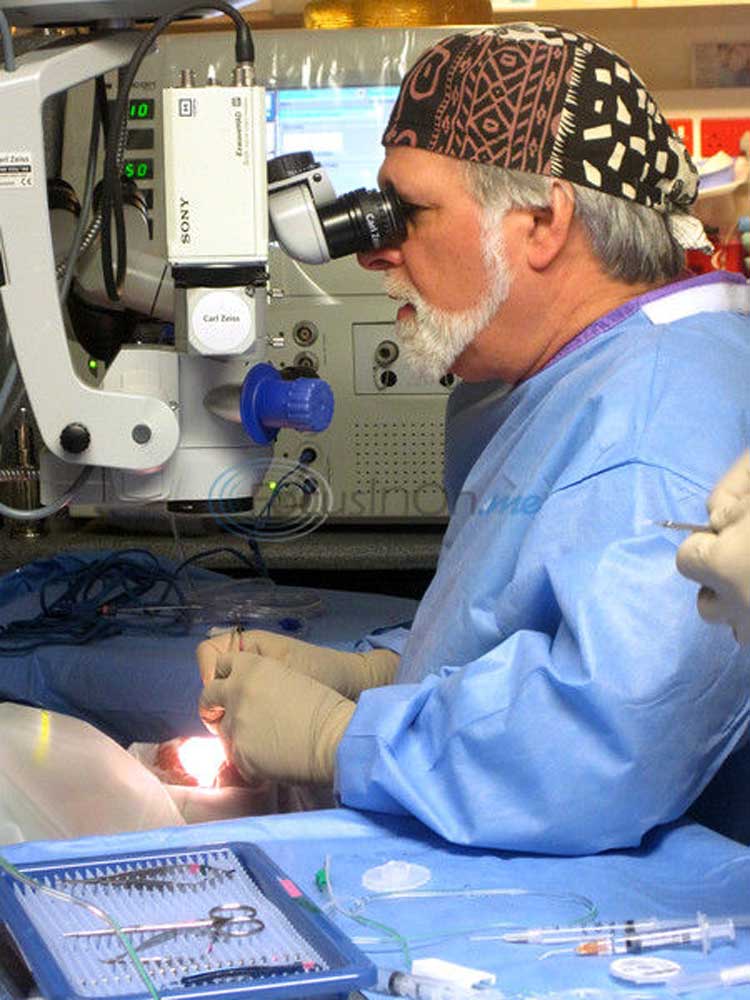East Texas ophthalmologist helps restore patients’ vision throughout the world
Published 10:06 pm Saturday, January 24, 2015

- Dr. Glenn Strauss performing surgery in Sierra Leone.
When Dr. Glenn Strauss, of Tyler, was training to become an ophthalmologist at The University of Texas Medical Branch – Galveston, he didn’t foresee a career of traveling the world helping the most vulnerable see again.
He is now one of the world’s leading eye surgeons treating blindness among people with cataracts in underdeveloped countries. As chief medical officer of the New York-based organization HelpMeSee, Strauss also is training other doctors.
A cataract, clouding of the lenses of the eye, is one of the most common causes of visual disability and vision loss and is related to the natural aging process.
People with cataracts can’t see shapes or figures, and colors can be indiscernible. Blues and greens don’t look blue and green anymore.
According to the World Health Organization, cataracts are responsible for 51 percent of world blindness, representing about 20 million people. In underdeveloped countries, citizens have little or no access to eye care.
“Ninety percent of those people live in these developing countries where I work,” Strauss said.
He first worked with HelpMeSee as a volunteer but is now a full-time employee with an office in Tyler. He’s been with the organization since 2010 and has worked with other organizations, including Mercy Ships.
“I believe this project offers the best hope for addressing the problem of cataract blindness, and it falls squarely in the hands of surgeons of the futures,” he said of HelpSeeMe. “My passion is preparing them to be the solution.”
In the countries where he works, cataracts and blindness have an economic and social impact on lives.
In children, the condition is more significant, as doctors aren’t skilled in special techniques for pediatric ophthalmology.
“They often die within five years after going blind because they can’t take care of themselves,” Strauss said. “They have injuries, they fall or they’re just completely rejected by their families. It’s quite the tragedy.”
Once mastered, cataract surgery can be completed in about five minutes. Strauss has typically performed about five or six in one hour.
While HelpMeSee has delivered more than 181,000 sight-restoring operations in India, China, Nepal, Vietnam, Peru, Togo and Sierra Leone, blindness due to cataracts continues to climb.
Strauss is developing a simulator to help train doctors and expects the first field training to be held in April. They hope to train 30,000 surgical specialists by 2030.
Strauss said lack of training yields an unacceptably high number of blind cases in parts of the world. This trend was a major driver to develop the simulator program at HelpMeSee.
“It turns out that in many of these countries anywhere from 20 to 30 percent of permanent blindness is caused by cataract surgery,” he said. “We need to reverse that trend and that’s what this training is all about.”
PARTNER IN MISSION
Strauss’s wife of 40 years, Kim, has helped with his mission work since 1997 and joined him full time in 2005. He calls her “an integral part of the success.”
Though she says she has a very weak stomach in a medical setting, she’s often the first line of contact on these projects. She prepares patients for surgery and prays over them.
“The patients are primary for me as far as their comfort and their understanding of what we have to offer,” Mrs. Strauss said. “I have to get people who may not understand the language, have never been to a doctor, have never had surgery to be calm. I gather a team to help me to do that.”
She touts her husband’s ability not only as a surgeon, but also to teach other doctors to become savvy businessmen and follow Biblical principles.
“His ability to train, even people who speak different languages, is just astounding,” Mrs. Strauss said.
THE CALLING
Strauss established Celebrate Sight, a gathering for patients during their final check up after surgery. They celebrate through song and dance and share stories of how their newfound sight has impacted their life. It’s the culmination of the mission of HelpMeSee.
When Strauss first began practicing ophthalmology, mission work was not on his radar. Additionally, he and his wife were not fond of traveling.
But what they refer to as a calling led them to traveling the world for much of the year. They have gone to more than 40 countries, including parts of Africa, Pakistan, India and Central America.
“It’s the fact that we were very sure that this is what God wanted us to do,” Mrs. Strauss said. “Otherwise, I had no draw. I was a homebody.”
About two years before they had an idea of what they were going do, Strauss called a prayer team together. Mercy Ships later called for him to do work with their team.
The call was the answer Strauss had been waiting for. It blossomed into life of charitable care and ministry.
He’s volunteered services for more than 26 years, and his passion for charitable care grew when he left his private practice in late 2004.
“Really, I would call it a faith decision,” he said. “It was one of those times where maybe it didn’t quite make sense. My wife and I were convinced that it was something that we needed to do.”






